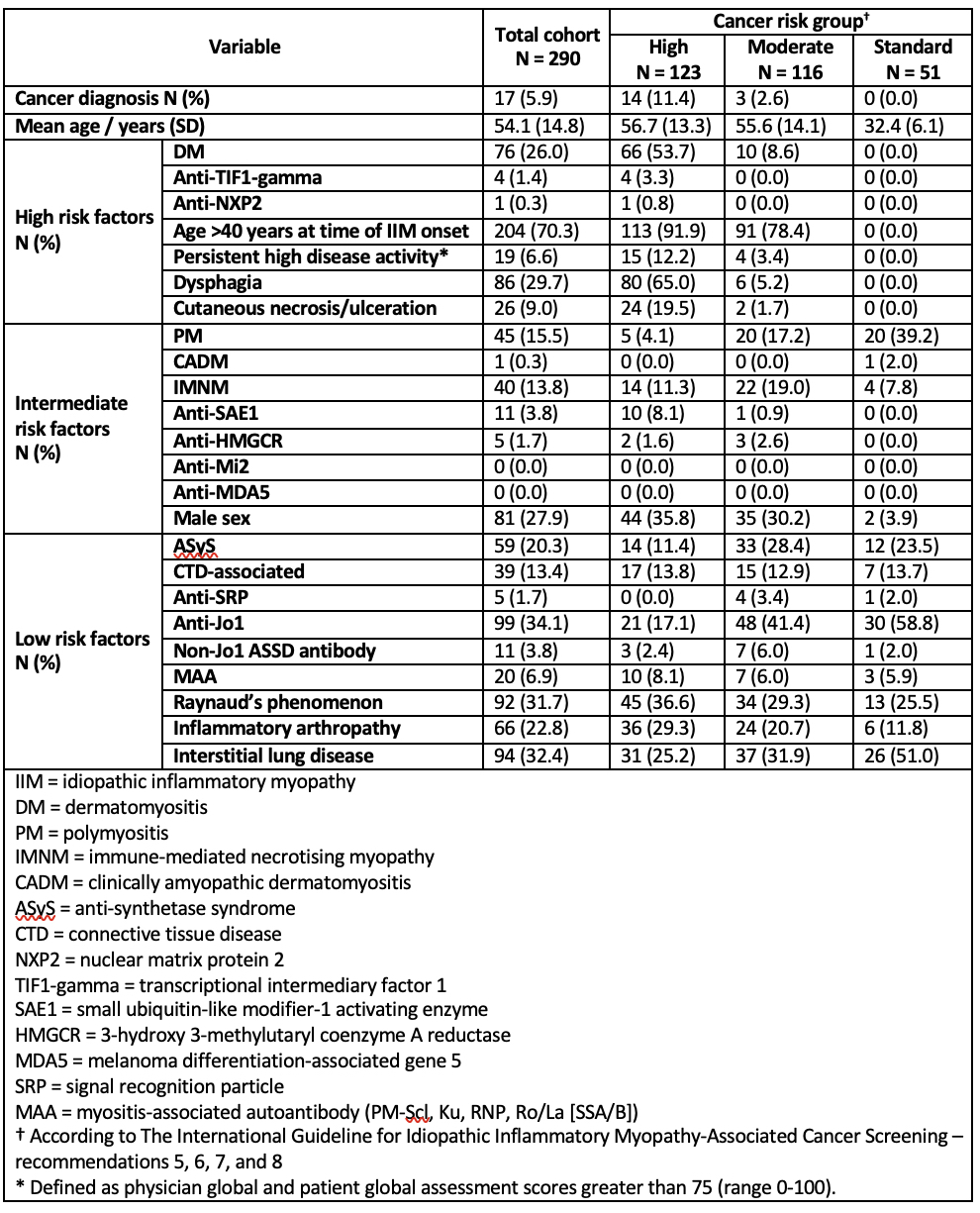Session Information
Date: Wednesday, November 15, 2023
Title: Abstracts: Muscle Biology, Myositis & Myopathies – Basic & Clinical Science II
Session Type: Abstract Session
Session Time: 9:00AM-10:30AM
Background/Purpose: Adult-onset idiopathic inflammatory myopathy (IIM) is associated with an increased cancer risk within three years prior to or following IIM onset. The International Guideline for Idiopathic Inflammatory Myopathy-Associated Cancer Screening recommends individual patient risk stratification into “high”, “moderate”, and “standard” according to IIM subtype, antibody profile, and clinical features[1]. Application in a real-world IIM cohort could assess the accuracy of this risk stratification approach and guide future amendments.
Methods: The MyoProsp study recruited a UK-based cohort with adult onset IIM within 2 years of diagnosis between 2016 and 2020. Comprehensive demographic, disease activity, IIM subtype, myositis-specific/associated autoantibody (MSA/MAA), and cancer data (primary cancer site, date of diagnosis) were collected. Estimated cancer risk of each participant (“high”, “moderate”, and “standard”) according to the International Guideline for Idiopathic Inflammatory Myopathy-Associated Cancer Screening was identified. “High disease activity” (a high risk factor) was defined as physician global and patient global assessment scores greater than 75 (range 0-100). As defined in the guideline, participants with two or more “high risk factors” (see Table 1) were assigned as high cancer risk; those with one “high risk factor” or two or more “intermediate risk factors” were assigned as moderate cancer risk; the remaining were assigned as standard risk. The concordance of risk stratification and actual cancer diagnosis was calculated across the cohort.
Results: Two hundred and ninety participants (72% female, mean age 54 years at time of recruitment) were included in the analysis (see Table 1 for a profile of IIM subtypes and presence of cancer risk factors). One hundred and twenty three participants (42%) fulfilled criteria for high cancer risk, 116 (40%) moderate risk, and 51 (17%) standard risk. Seventeen cancers (6% of whole cohort) were detected within the cohort, of which five (29%) were breast cancer, two (12%) cancer of unknown primary, two stomach (12%), and one (6%) each of bladder, endometrial, kidney, lung, lymphoma, oesophagus, ovarian, and prostate. The “high risk” group displayed the highest proportions of cancers (n=14, 11%), followed by the “moderate risk” group (n=3, 3%; one each of breast, endometrial, and kidney cancer); no participant with “standard risk” had a cancer diagnosis.
Conclusion: Risk stratification recommended by The International Guideline for Idiopathic Inflammatory Myopathy-Associated Cancer Screening clearly and appropriately stratified cancer risk in a real-world IIM cohort, thus demonstrating clinical utility. Future research should focus on investigating the impact of risk stratification upon stage at time of cancer diagnosis and outcomes, including survival.
[1] Oldroyd A, Callen J, Chinoy H, Chung L, Fiorentino D, Gordon P, Machado P, McHugh N, O’Callaghan A, Schmidt J, Tansley S, Vleugels R, Werth V, Aggarwal R. Cancer Screening Recommendations for Patients with Idiopathic Inflammatory Myopathy [abstract]. Arthritis Rheumatol. 2022; 74 (suppl 9).
To cite this abstract in AMA style:
Oldroyd A, Bozan F, Lyu X, Gordon P, Isenberg D, McHugh N, Gunawardena H, Kiely P, Lamb J, Machado P, Miller J, Tansley S, Chinoy H. Accurate Stratification of Cancer Risk in a Real-World Cohort Using the International Guideline for Idiopathic Inflammatory Myopathy-Associated Cancer Screening [abstract]. Arthritis Rheumatol. 2023; 75 (suppl 9). https://acrabstracts.org/abstract/accurate-stratification-of-cancer-risk-in-a-real-world-cohort-using-the-international-guideline-for-idiopathic-inflammatory-myopathy-associated-cancer-screening/. Accessed .« Back to ACR Convergence 2023
ACR Meeting Abstracts - https://acrabstracts.org/abstract/accurate-stratification-of-cancer-risk-in-a-real-world-cohort-using-the-international-guideline-for-idiopathic-inflammatory-myopathy-associated-cancer-screening/

